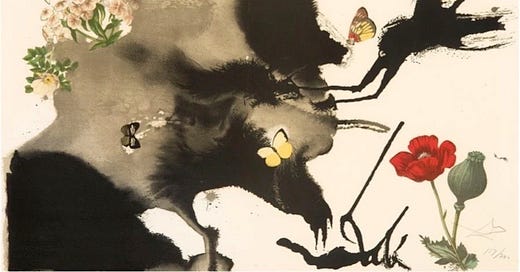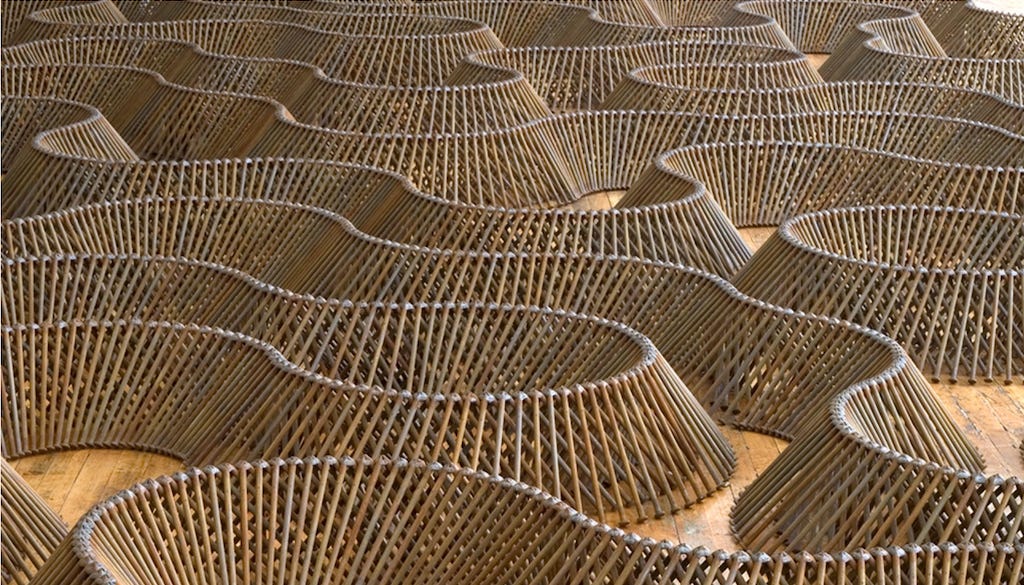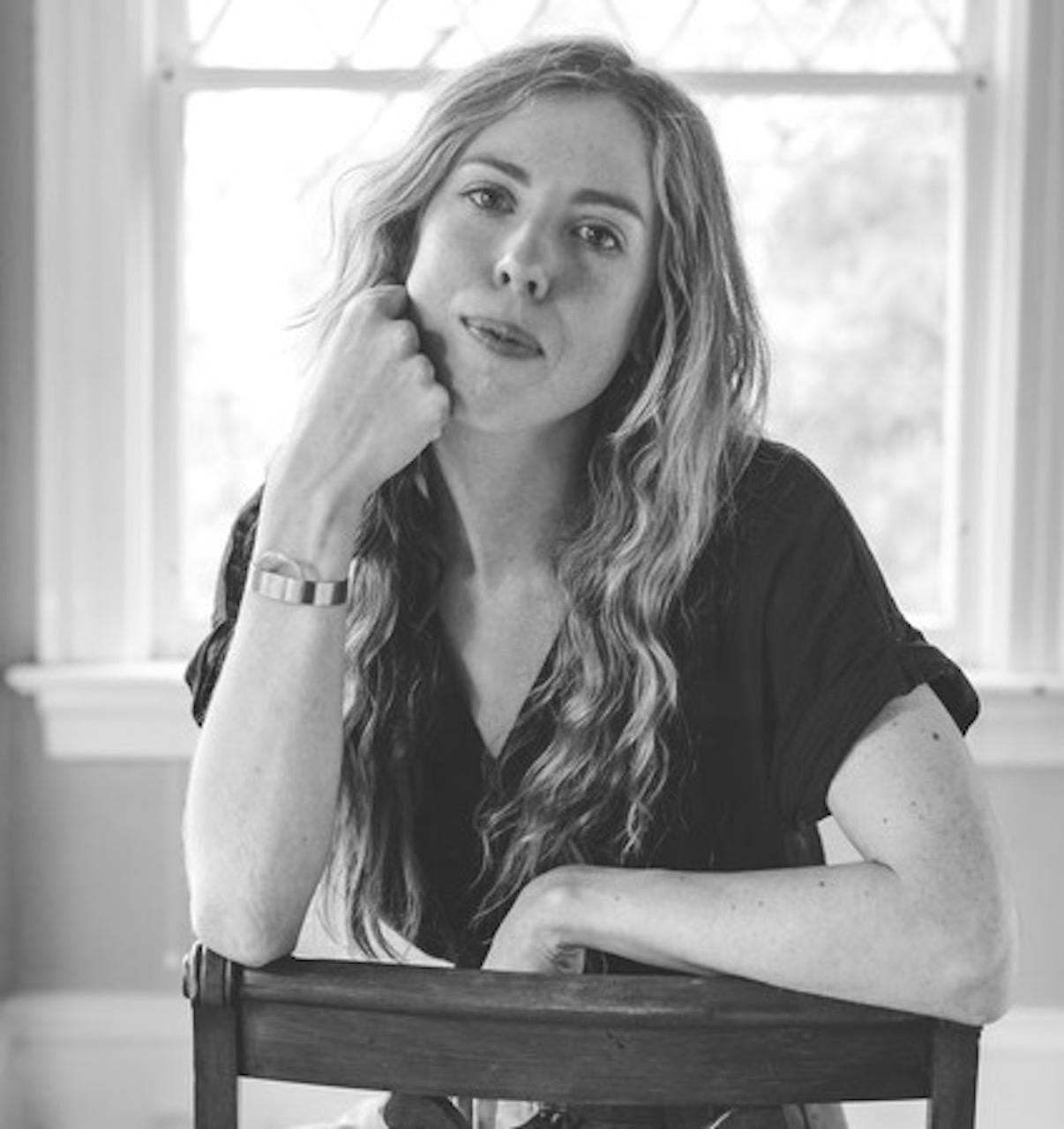Prompt 246. What I Learned from the Annies
& the writer Erica Berry on telling the truth
Hi friend,
Summer continues to usher itself in. These days I’m living in caftans and worn Birkenstocks, or even going barefoot, both because it’s warm out and because there’s the most glorious emerald moss growing between the pavers on my patio, like nature’s grout, and I don’t want to damage it.
That’s been one of the most interesting things about coming back to my farmhouse after being away—noticing what’s changed, however small. As part of my spring cleaning last week, I tackled the outdoor furniture, and when I took the cushion off the sofa, I found a pile of decaying leaves writhing with ants. The leaves and ants were almost the same color, a rusty brown, and it took me a moment to realize it wasn’t the leaves moving, but tiny insects. My first impulse was revulsion, then irritation that I would have to clean it up.
And then I stopped to really watch them, and I was fascinated. The ants moved with such purpose, and I began to wonder how long they’d been there—and what exactly were they doing? Building a nest? Gathering food? I still don’t know, and it continues to echo. (Any experts on ant behavior out there? I’d love to hear from you in the comments!)
I’ve come to think of this as the Annie Dillard effect. In her Pulitzer prize-winning book Pilgrim at Tinker Creek, anything and everything is worthy of her attention—the caterpillar larva on long strands of grass, a gas station sunset, a quiet part of the creek where if she sits long and still enough, she might spot a muskrat (such skittish, elusive creatures). Since reading it, all the time I find myself stopping, watching, wondering.
And now another Annie comes to mind—the fiction writer Annie Proulx. When I was at Ucross, the writer’s residency in Wyoming, we’d go to this bar every weekend we called the Cowboy Bar (though I’m pretty sure that was not its actual name), where she supposedly got the idea for her famous short story, later turned into a movie, “Brokeback Mountain.” As the tale goes, she was there one night and caught a glance between a cowboy playing pool and another sitting alone at the bar—a glance that seemed to mean something more. She was curious, she wondered what that something more was, and she went back to her studio and wrote into that possibility.
What both these writers have taught me is that the tiniest moment can be a portal into something much bigger. I think of this when people say, “I could never write a memoir, I don’t have some big epic story.” To me, what makes a story interesting is not just the details or facts of it, but how we’re in conversation with them. I think of writers as pseudo-anthropologists—as listeners, as observers, as pattern diviners. That means whatever I’m experiencing, whether it’s heartbreaking or astounding, has the potential for more. Maybe it’s the magic of seeing a story emerge. Maybe it’s coming to understand something like a writhing pile of leaves—at first revulsive, then irritating, then fascinating—as a meaningful metaphor.
This probing and circling to get closer to the truth is the subject of today’s essay and prompt. From my friend and the brilliant nonfiction writer Erica Berry, it’s a poignant meditation on telling tall tales and wrangling magic from the mundane.
Sending love,
Suleika
An item of note—
We’ve scheduled our next meeting of the Hatch, our virtual creative hour for paid subscribers. It’s happening the first official weekend of summer—that’s Sunday, June 25, from 1-2 pm ET. You can add it to your calendar by clicking here.
Prompt 246. Circling the Truth by Erica Berry
I learned the pleasures of exaggeration as a tween. Opening my mouth at the dinner table, I’d spin a story about something I had encountered at school. I was eager to make my family laugh. My parents had recently begun working together to start a business, and the specter of stressful days often joined us at the table. Reality, I was learning, was hard. A good story couldn’t fix it, but it might offer something palliative—a damp rag on a hot day.
Whereas some kids inflated truth to make themselves sound better, I was most comfortable in a coda of self-deprecation. I exaggerated to make my life more absurd. If in real life I tripped down a few steps, in my stories, I fell down a whole flight. Will you believe me if I say the exaggerations were unintentional? I never premeditated. All day I’d collect moments—things seen or done—then, elbows on the table, empty my pockets. Every now and then, encouraged by crinkled brows and toothy grins, my lived experience would tip into something else.
I never invented new scenarios, just tweaked and buffed the ones I had. I felt less like a fabricator than a person at a mixing board, adjusting the dials, trying to help the listener along. I now remember less what I exaggerated than how it felt when the untruth slipped from my lips: a dog running through a swinging door. By the time I clocked its escape, it was already too late.
Today, recalling those exaggerations conjures a strange mixture of shame and pride. Sure, I was falling in love with storytelling, but I was also convincing myself that my own truth was not enough. In the nearly two decades since, I have made my career as a writer of fact. My first book lives on the “nonfiction” shelf, a word defined only by its insistence on the anti-lie. To exaggerate is to suggest that without embellishment, the raw material of our lives is too dull. My work today is compelled by a desire to prove that instinct wrong.
I think of my former sculpture professor, a man whose only material is nails. For decades he has hammered and bent and welded them, uncovering new possibilities for their form. Constraint, he always told us, was the seed of creativity. I love reading fiction, just like I love playing out alternate versions of my life, but at least for now, as a writer, I relish the nails of fact. I have felt myself transformed when, after a day of circling the truth, some shard of life glints back at me, anew.
Your prompt for the week:
Think of something so quotidian that at first glance it seems too small, too insignificant, too boring for anyone’s attention. Carrying your groceries in from the car, catching a stranger’s eye in a dark shop window. How can you write into that moment? How can you explore and expand it while still adhering to the truth? As a sociologist once told me: Our job is to make the familiar strange.
If you’d like, you can post your response in the comments section, in our Facebook group, or on Instagram by tagging @theisolationjournals.
Today’s Contributor—
Erica Berry is a writer and teacher based in her hometown of Portland, Oregon. Her essays appear in The Guardian, The New York Times Magazine, The Yale Review, Outside, and other publications, and her first book, Wolfish: Wolf, Self, and the Stories We Tell About Fear, was recently published by Flatiron Books (U.S.) and Canongate (U.K.). Find her at @ericajberry and www.ericaberry.com.
For more paid subscriber benefits see—
To Betray or Not to Betray, an installment of Dear Susu where I share my good-faith protocol for writing the truth without alienating loved ones
25 Things About Me, where our community reprised a viral Facebook game and we ended up with hundreds of laid-bare snapshots of human life—honest, strange, and beautiful
On Touching the Truth, an interview with the very wise Nadia Bolz-Weber where we talk about the power of confession as an antidote to shame












We have two plants in our new home. Christopher has been in the family for a couple of years, and Hilda was a housewarming gift from a new neighbor. Every morning I open the shades and place Christopher and Hilda near each other so they can pick up on their conversation and observations from the day before. Christopher would be a hermit if left to his own devices, and Hilda is a nosy busybody taking in all the street below has to offer and daily drama (at least she hopes) in the household. Hilda helps Christopher see life outside the pot, and Christopher provides Hilda with safe and steady support as she can be neurotic at times. Both C+H are a source of air-purifying, life-giving beings that balance each other and our home. 🍃🌱
Really powerful essay. It reminds me to keep my eyes open to every gesture, every glance, every exchange, small and large. The stories are absolutely everywhere. In and around us. All at once.